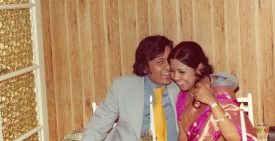I’m a hospice volunteer newly assigned to work with a 36-year-old man with Down Syndrome coping with the impending death of his mother. The family wants me to get to know him now and help him through the bereavement process. I have no training with the developmentally disabled and little experience with bereavement – mostly with elder spouses. Right now, the man tears up and shuts down when asked about his mother’s illness.
The hospice’s social worker, who is working with the family, is helping me out a bit. But do you have any resources to offer? The hospice suggested a kind of life review project. One idea is creating a Facebook page he could host to share his interests and manage tributes to his mother. The man has basic computer, reading and writing skills and dreams of going to Hollywood to become a movie producer.
As much as I believe death and grieving are natural parts of life, and something you need no special skills beyond empathy to help someone with, it sounds like you both may be in deeper water than you’re used to on this one. This is a heavy load not just for him but also you, and I hope you continue to reach out to the hospice, family, and social worker as much as possible to get the help you need to help him.
For most people, losing a mother is a life-altering experience (a “total game changer” as I once referred to it – making me sound like the world’s worst daughter). But according to Dr. Nancy Crown, a psychologist who works with adults and children with developmental disabilities, “most adults with disabilities have closer and necessarily more dependent relationships with parents, especially mothers. Therefore, this loss is likely to be more frightening and destabilizing than for someone without disabilities. He may need reassurance that his practical needs will continue to be met. Many, but certainly not all, adults with disabilities have diminished ability to express feelings. Sometimes, depending on the cognitive style of the person, communication about the loved one may be indirect. For example, he may talk about his mother in terms of activities they shared together or favorite meals she prepared for him. Most of these adults lack a community, so his support system beyond his family may be quite limited.”
It’s understandable that your client can’t talk about his mother’s illness and approaching death. Still, perhaps he can talk about her life. If you engage him on what she likes, what they liked to do together, that might serve as a good jumping off point for what types of tributes he’d find most meaningful.
In the meantime, Dr. Crown suggests that involving him in his mother’s care. Shopping for small items like hand lotion, a magazine or flowers or, depending on the circumstances, taking her for a walk or just sitting at her bedside and holding her hand, could be very comforting to both of them. Most importantly, Dr. Crown points out, “We often over-focus on what we can do for people with disabilities. They have a lot to offer and it’s important to give them opportunities to support us.”
Depending on his mother’s current condition, other ideas include:
• Could he (or someone else) record her reading a favorite childhood story of his, or singing a song she used to sing to him as a child?
• Is she capable of recording an interview with him or with another family member for him? Storycorps helps people record interviews about important aspects of their lives; their website is full of selected recorded interviews and meaningful questions that can serve as jumping-off points.
• Create a slideshow of photos set to a favorite song would help unleash his inner movie producer. Perhaps he could share this with her or other family members.
• If she is much closer to death, work with him to make a playlist of songs meaningful to them both that could play in her room.
As you think through these options, I’m sure opportunities will arise for other ways to honor her that will resonate with him.
Meg Tansey hails from New England, where talking about your feelings is frowned upon. She has lots of life experience but is not an actual therapist. Meg has a MFA from The New School and currently lives and writes in New York City. Send Meg your questions at [email protected] (subject: Ask ML).
Please note: Questions may be edited for length or clarity. Modern Loss is not a therapeutic adviser; this category should only be used as a guide. Users should verify the veracity and appropriateness of the information posted on the site with his or her own therapeutic adviser.








